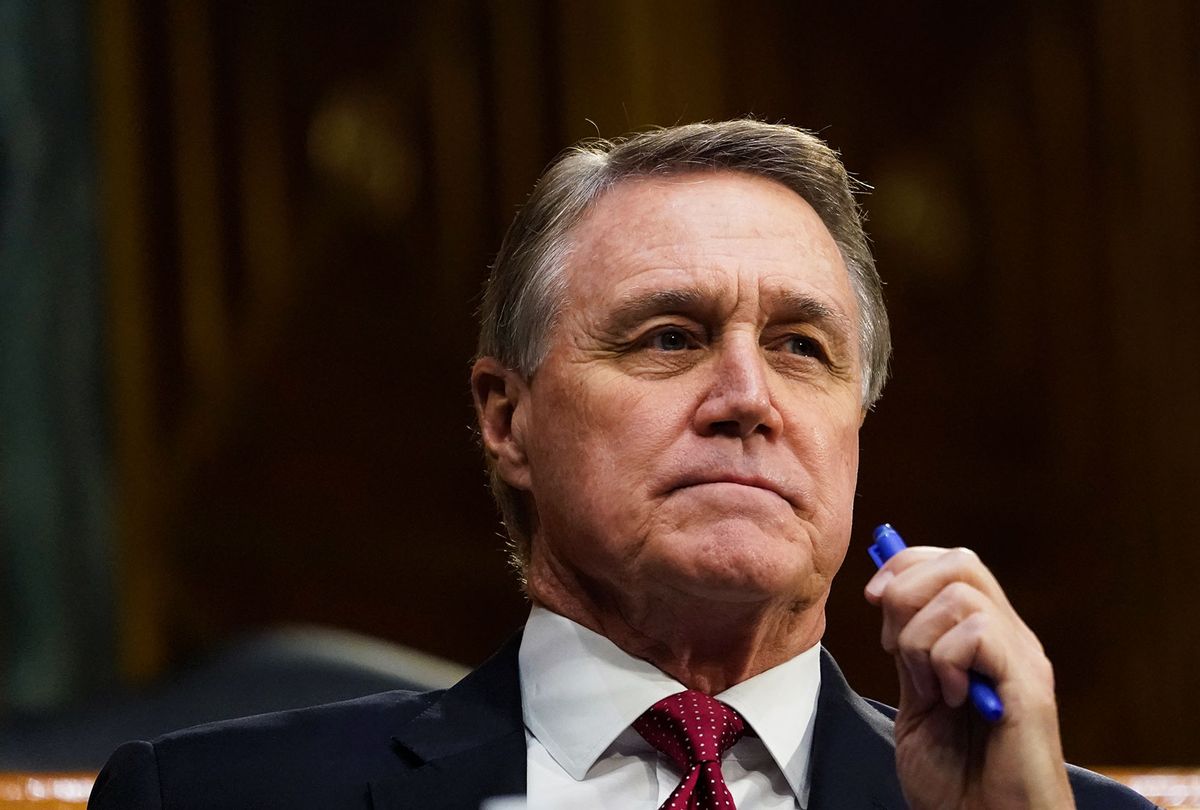The Federal Election Commission (FEC) sent Sen. David Perdue, R-Ga., a lengthy letter last week asking the embattled GOP incumbent to explain a number of apparent violations in his campaign contribution filings this year, including from a banking organization and a major pharmaceutical PAC.
The letter, which covers July through the end of September, notes four types of violations: excessive contributions from both individuals and committees; corporate donations; and a contribution from an unregistered committee.
Perdue must reconcile more than $50,000 in individual contributions, as well as about $23,000 from committees, including the Consumer Bankers Association PAC and AzPac — the employee PAC for pharmaceutical giant Astra Zeneca, which gave the campaign more than the $5,000 limit.
Notices about excessive contributions are not uncommon nor necessarily indicative of wrongdoing — the assumption is that campaigns want to follow the rules but may have made mistakes in the heat of the contest.
For instance, when the FEC notifies a campaign that it has taken too much money from donors, the letter lists the names and donation histories of the supporters who gave too much, so the campaign can isolate the over-limit amounts and refund, reattribute or redesignate that money. Campaigns have 60 days to do so before they must report back to the FEC.
Some of those lists this year, however, have been exceptionally long — a phenomenon which election experts attribute to automated recurring donations over a long and particularly intense campaign season.
The Trump campaign dominates in this arena: In September, the FEC flagged more than 35,000 contributions from 1,045 donors, totaling more than $4.5 million in donations which the campaign must explain and reconcile. That list was 855 pages long. On Oct. 1, the FEC sent the campaign another letter flagging excessive donations, which was 814 pages long. And FEC's list of excessive Trump donations for the month of August alone was more than 1,000 pages long.
"You have to consider the possibility that some of these serial donors may not have fully appreciated what they were doing when they signed up for recurring contributions," Brett Kappel, campaign finance expert at Harmon Curran, previously told Salon.
(The Trump and Perdue campaigns happen to share a treasurer, Bradley Crate, who is responsible for clearing up all of this accounting. Crate was listed as treasurer for 25 committees that registered this year alone, including Trump's new leadership PAC, Save America.)
Typically, with a notice such as Perdue's, which appears after the election, a candidate would not have to worry about balancing refunds with future expenditures to sustain their campaign. However, Perdue did not lock up a win in the general election, and he now finds himself facing a tight runoff against Democratic rival Jon Ossoff in January.
A focal point of that contest appears in the FEC letter: Perdue's connections to financial and pharmaceutical interests.
Salon reported last week that Perdue, a multimillionaire former business executive who has recently seen a resurgence of pressure related to numerous accusations of insider trading, dealt in hundreds of thousands of dollars in bank stock while he sat on the Senate Banking Committee. In that time, he sponsored or co-sponsored 14 pieces of pro-bank legislation while accepting more than $1 million in campaign contributions from the financial industry.
The Peach State conservative also drew scrutiny for his investments in pharmaceutical giant Pfizer ahead of the coronavirus pandemic.
Perdue claimed he was not personally involved in his trades, and over the summer federal investigators cleared him of any crimes related to the transactions. However, The New York Times reported last week that Perdue's public defense did not add up: Email communications show that the senator instructed his Goldman Sachs wealth manager to sell $1 million of stock in a financial firm two days after the company's CEO sent him a personal email tipping Perdue off to "upcoming changes." Weeks later, the CEO stepped down and the firm's stock tanked.
Republicans are pouring money into Perdue's runoff, which is paired on Jan. 5 with unelected Georgia Republican Sen. Kelly Loeffler, another multimillionaire legislator who has been plagued by accusations of insider trading amid the coronavirus pandemic.
The winners will determine which party controls the Senate, and ad spending on the race recently topped $250 million. The Republican National Committee, which has focused fundraising efforts on the runoffs hoping to salvage control of the upper chamber after outgoing President Donald Trump's stinging upset in the deep-red state, recently accepted a $257,828 infusion — the last of the cash from the 2016 Republican National Convention planning committee.
The Perdue campaign did not immediately reply to Salon's request for comment.



Shares